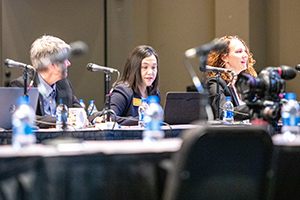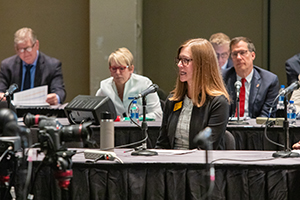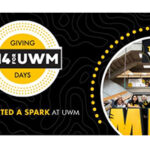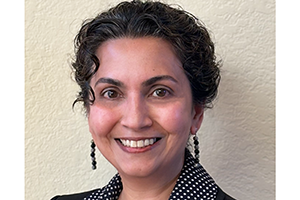UWM has forged partnerships with academic and industry partners aimed at increasing diversity in the workforce and driving economic prosperity in southeastern Wisconsin.
Efforts include initiatives that support hiring and purchasing from underserved communities, as well as those focused on connecting diverse student talent with regional employers, a group of UWM staff and faculty members told the UW System Board of Regents’ Research, Economic Development and Innovation Committee on Thursday.
One of the newest such efforts already is off to a promising start.
The Student Success Talent Pipeline program launched this year in partnership with the Metropolitan Milwaukee Area Chamber of Commerce. It was made possible through a $500,000 Wisconsin Fast Forward grant provided by the state Department of Workforce Development.
The funding allows for the placement of 100 students from underrepresented populations into paid internships with Milwaukee-area corporations over the next two years. More than 50 companies attended an information session about the program last month, highlighting the level of interest among employers in a tight labor market.

“There is more demand for the program than there is funding,” Jennifer Abele, senior executive director of UWM’s Office of Strategic Partnerships, told regents. “We want to get the foundation set, make the program seamless and get partners at the table.”
The Student Success Talent Pipeline program would provide students with crucial out-of-classroom experience to develop the skills and confidence to help them succeed after graduation, said Chia Vang, UWM’s vice chancellor of diversity, equity and inclusion.
Chancellor Mark Mone recounted a conversation with one employer participating in the program that committed to bringing in 15 interns but had room to take on more. The interest level highlights the potential to secure additional funding to keep the program going after two years.
“Isn’t it our responsibility as employers and educators to think more deeply and aggressively about how people in our state can be more prosperous” and get better pay, said Regent Robert Atwell, chair of the committee.
“I’d love to see more of this to be done. … I would love to see this program be self-sustaining” and profitable, Atwell said.
Other partnership initiatives highlighted at the meeting:
- Milwaukee Anchor Collaborative: UWM joined this partnership, which includes major health care and educational institutions, in August 2021. The effort is devoted to hiring more people of color, retaining minority employees and spending more money with minority-owned businesses in disadvantaged neighborhoods. While Milwaukee Anchor Collaborative covers the entire city, the effort is targeted at eight ZIP codes in which about one-third of the 206,000 residents overall live in poverty.
- Connected Systems Institute: Launched in 2017, Connected Systems Institute is focused on developing the talent pipeline for Wisconsin manufacturers. Among the latest developments is a proposed master’s program in connected systems that could launch in Fall 2023. UWM established CSI in partnership with Rockwell Automation, with additional support from WE Energies and the Wisconsin Economic Development Corporation. Other contributing partners include Cisco, Dell, and Microsoft.
- Northwestern Mutual Data Science Institute: Regents approved a bachelor’s program in data analytics and master’s program in data science earlier this year. UWM partners with Northwestern Mutual and Marquette University on this initiative.
Focusing on students
UWM is launching a “coordinated care” model of student support in the fall that the university hopes will provide more opportunities to quickly respond to needs of students or proactive intervention.

Kay Eilers, associate vice chancellor of enrollment management, told the regents’ Education Committee that the effort would resemble a social services model of support, in which a single point of contact could help a student with a range of potential issues and connect them with the right resource. UWM is expanding the use of its Navigate advising platform to help build its more holistic support effort.
“This allows to be more strategic with support for students, rather than triaging,” Eilers said as part of her update to regents on student-centric initiatives at UWM.
“All of this work really was bolstered and informed by what our students experienced at the start of the pandemic,” she added.
Becoming a more student-centric university is one of the tenets of UWM’s 2030 initiative, which is intended to guide the institution into the next decade and beyond. Other recent or upcoming changes in this area at UWM include:
- The creation of a Student Financial Services Center in the fall that would give students and their families one central place for financial issues. “We want to demystify all that is related to college finances,” Eilers said.
- The creation of a Student Experience and Talent unit that coordinates career services functions, advances experiential learning opportunities and creates a “front door” for employers and other prospective partners in the community. Laurie Marks, who earlier this year was named the inaugural executive director of student experience and talent, is also involved with the Student Success and Talent Pipeline initiative.
Student dining
UWM is revamping its meal plan options for students who live on campus starting in the fall. The new Anytime Dining plan allows a resident student to go to a dining hall at any time, as many times as they would like and eat as much as they want to eat.
The change was made in part to address concerns about food insecurity among students, Kelly Haag, vice chancellor of student affairs, told regents during a presentation about food insecurity on system campuses. The university responded to a survey of student needs and worked with the resident hall government on the overhaul.
“That needs to be priority No. 1 — if a student is going to school hungry, you’re not really learning,” Haag said.






